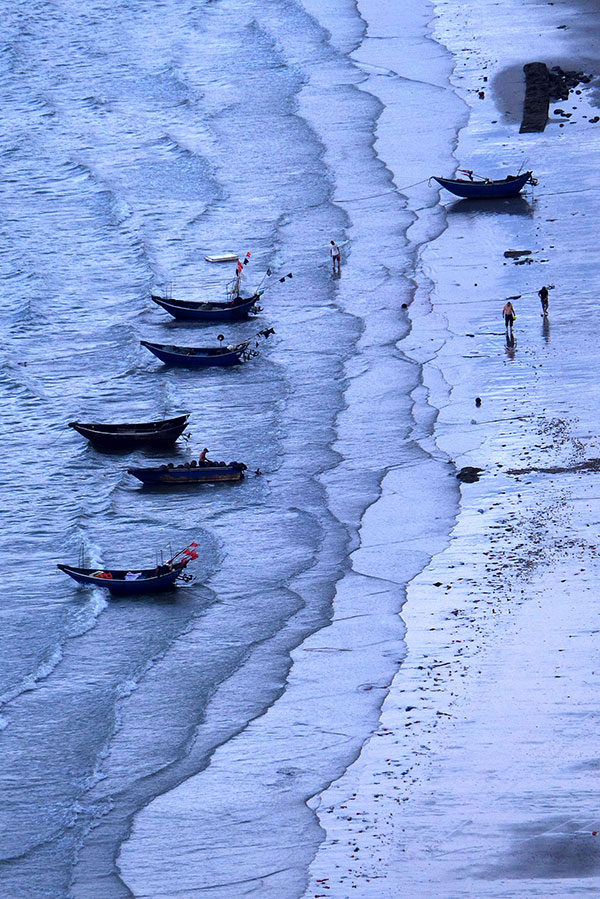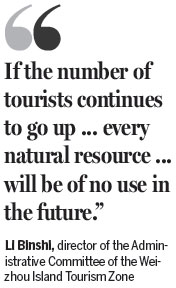|
 Fishing boats are made ready to set sail from Weizhou Island in the Guangxi Zhuang autonomous region where many locals are now earning their living from tourism. Li Junguang / for China Daily |
Cleanup, fewer visitors seen as 'win-win strategy'
Weizhou Island in the Guangxi Zhuang autonomous region is also known as China's barrier reef. It's the largest and youngest volcano island in the country and has attracted millions of tourists annually in recent years.
As tourism has developed, local residents who once made a living by raising poultry or fishing now have jobs serving visitors. An estimated 16,000 residents on the island work in the tourism industry.
But for Li Binshi, who set foot on Weizhou for the first time last year, the island wasn't impressive. There was no sewage treatment plant at the time, and the island wasn't quiet.
Weizhou consisted of hotels built by local residents and narrow streets thronged by dense crowds of tourists.
An old man who has lived on the island for over 50 years told him that even so many hotels are not enough to accommodate all the tourists who come to the island. The man said he had seen more than 400 tourists sleeping on the beach when no hotels were available in the peak season one year.
"It might be good news for officials who found potential for developing tourism, but not for me," Li said.
Too many people produced trash and sewage. The latter, which was discharged untreated directly into the sea, prompted environmental watchdogs to worry about the coral reefs.
Wang Xiaoqiang, director of the Department of Environmental Protection under the State Oceanic Administration, said overgrowth of algae, caused by increased nitrogen dumped into the sea, cut off sunlight required by coral reefs.
According to Wang, the coral reefs have strict environmental restrictions. Water must be clear so that a maximum amount of sunlight penetrates it. The water quality must meet Level I under national standards, the highest level suitable for protecting rare species of fish.
The water situation is just one aspect of environmental protection on the island, Wang said.
Most of the islands lag behind in infrastructure construction, with inconvenient traffic and poor sewage treatment facilities, according to a report by the administration, the China Oceanic Development Report 2015.
For Li, who is now director of the Administrative Committee of the Weizhou Island Tourism Zone, even though the marine environment was generally healthy at the time, he felt that overheated tourism would be a disaster for an island with no basic environmental protection infrastructure.
From that initial negative impression, Li realized the importance of slowing the pace of tourism development and turning the focus to environmental protection, even if it meant some economic loss.
"If the number of tourists continues to go up with no effort toward protection, every natural resource that could generate revenue will be of no use in the future," Li said last year when he proposed rules that would limit the number of tourists.
Starting in June last year, the maximum number of tourists has been controlled at 7,000 per day, under a plan released by the Beihai city government, which administers Weizhou Island.
But fewer tourists means less revenue. Although one tourist might generate 600 yuan ($96.6) a day, the full loss is hard to measure, according to an official of the tourism zone who asked not to be named.
When asked if it is possible to have strategies that are both green and profitable, Li said that sacrificing short-term revenue might be the only option. "A win-win strategy is only possible when basic environmental protection infrastructure has been built," he said. "But we are starting from zero."
Full responsibility
After the first sewage treatment plant went into operation in December, the problems caused by sewage dumping seemed to be solved. The plant has the capacity to process 4,000 metric tons of sewage daily, "enough to meet the current demands of local residents and tourists", Li said.
After sewage is collected and treated, water quality generally meets Level I standard, according to Zhou Haoliang, a researcher at the Guangxi Mangrove Research Center, who conducted research on the growth of coral reefs.
But many believe coral reef marine habitats deserve further protection.
The solution is what local landscape architects call a "sponge island", which in part borrows the idea of "Sponge City", a project launched by the Ministry of Housing and Urban-Rural Development and the Ministry of Water Resources.
The project aims to treat water in a natural way and reduce runoff. Wetland soil can absorb at least 60 percent of rainwater, keep it on site and return it to the underground water table, according to a government guide released in November.
While the artificial wetland on the island works well in holding rainwater for future use, the idea of building a "Sponge Island" has to do with more protective concerns, according to Wang Chongliang, deputy director of the administration committee.
Niujiaokeng Wetland, covering 3.3 square kilometers, cleans up treated water piped to the wetland before it is finally discharged into the ocean.
What once was an unsightly sewage lagoon where residents went to dump trash is now a park visited by cranes and many other wild birds.
"We are achieving two things at one stroke," Wang said. "Water discharged into the ocean can be purified, while making sure that wetlands will not experience a state of drought."

Joint efforts
Even though much progress has been made in protecting the environment, Li has other concerns.
For example, the narrow street leading to the Catholic church on the island - one of its must-see tourist sites - is clogged with stalls selling handmade souvenirs, leaving little space for tourists to move. Small coral handicrafts are hidden behind other souvenirs, and merchants only take them out upon request.
Han Li, a merchant who has lived on the island for more than 40 years, said selling souvenirs and operating inns for four months annually provides enough income to support her family. With no penalties at present, she said that she cannot think of a reason to give up. Her annual income has quadrupled in the five years since she took up the business.
However, Li, the administrative committee director, said: "Even though some villages on the island have held training classes on protecting the environment and operating a business, the most urgent need is to set the rules down with specific standards for operating self-started businesses.
"We really hope we can work together with the 160,000 residents on the island to make it a better place to visit."
Wang Yanfei in Beihai, Guangxi Zhuang autonomous region, contributed to this story.
